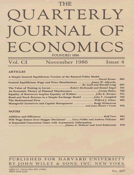-
Views
-
Cite
Cite
Jeremy Bulow, An Economic Theory of Planned Obsolescence, The Quarterly Journal of Economics, Volume 101, Issue 4, November 1986, Pages 729–749, https://doi.org/10.2307/1884176
Close - Share Icon Share
Abstract
“Planned Obsolescence” is the production of goods with uneconomically short useful lives so that customers will have to make repeat purchases. However, rational customers will pay for only the present value of the future services of a product. Therefore, profit maximization seemingly implies producing any given flow of services as cheaply as possible, with production involving efficient useful lives. This paper shows why this analysis is incomplete and therefore incorrect. Monopolists are shown to desire uneconomically short useful lives for their goods. Oligopolists have the monopolist's incentive for short lives as well as a second incentive that may either increase or decrease their chosen durability. However, oligopolists can generally gain by colluding to reduce durability and increase rentals relative to sales. Some evidence is presented that appears to be generally consistent with the predictions of the theory.



